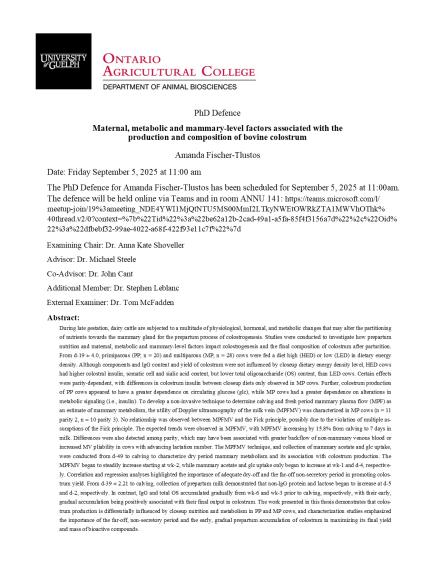The defence will be held online via Teams and in room ANNU 141: https://teams.microsoft.com/l/meetup-join/19%3ameeting_NDE4YWI1MjQtNTU5MS00MmI2LTkyNWEtOWRkZTA1MWVhOThk%40thread.v2/0?context=%7b%22Tid%22%3a%22be62a12b-2cad-49a1-a5fa-85f4f3156a7d%22%2c%22Oid%22%3a%22dfbebf32-99ae-4022-a68f-422f93e11c7f%22%7d

Maternal, metabolic and mammary-level factors associated with the production and composition of bovine colostrum
During late gestation, dairy cattle are subjected to a multitude of physiological, hormonal, and metabolic changes that may alter the partitioning of nutrients towards the mammary gland for the prepartum process of colostrogenesis. Studies were conducted to investigate how prepartum nutrition and maternal, metabolic and mammary-level factors impact colostrogenesis and the final composition of colostrum after parturition. From d-19 ± 4.0, primiparous (PP; n = 20) and multiparous (MP, n = 28) cows were fed a diet high (HED) or low (LED) in dietary energy density. Although components and IgG content and yield of colostrum were not influenced by closeup dietary energy density level, HED cows had higher colostral insulin, somatic cell and sialic acid content, but lower total oligosaccharide (OS) content, than LED cows. Certain effects were parity-dependent, with differences in colostrum insulin between closeup diets only observed in MP cows. Further, colostrum production of PP cows appeared to have a greater dependence on circulating glucose (glc), while MP cows had a greater dependence on alterations in metabolic signaling (i.e., insulin). To develop a non-invasive technique to determine calving and fresh period mammary plasma flow (MPF) as an estimate of mammary metabolism, the utility of Doppler ultrasonography of the milk vein (MPFMV) was characterized in MP cows (n = 11 parity 2, n = 10 parity 3). No relationship was observed between MPFMV and the Fick principle, possibly due to the violation of multiple assumptions of the Fick principle. The expected trends were observed in MPFMV, with MPFMV increasing by 15.8% from calving to 7 days in milk. Differences were also detected among parity, which may have been associated with greater backflow of non-mammary venous blood or increased MV pliability in cows with advancing lactation number. The MPFMV technique, and collection of mammary acetate and glc uptake, were conducted from d-49 to calving to characterize dry period mammary metabolism and its association with colostrum production. The MPFMV began to steadily increase starting at wk-2, while mammary acetate and glc uptake only began to increase at wk-1 and d-4, respectively. Correlation and regression analyses highlighted the importance of adequate dry-off and the far-off non-secretory period in promoting colostrum yield. From d-39 ± 2.21 to calving, collection of prepartum milk demonstrated that non-IgG protein and lactose began to increase at d-5 and d-2, respectively. In contrast, IgG and total OS accumulated gradually from wk-6 and wk-3 prior to calving, respectively, with their early, gradual accumulation being positively associated with their final output in colostrum. The work presented in this thesis demonstrates that colostrum production is differentially influenced by closeup nutrition and metabolism in PP and MP cows, and characterization studies emphasized the importance of the far-off, non-secretory period and the early, gradual prepartum accumulation of colostrum in maximizing its final yield and mass of bioactive compounds.

